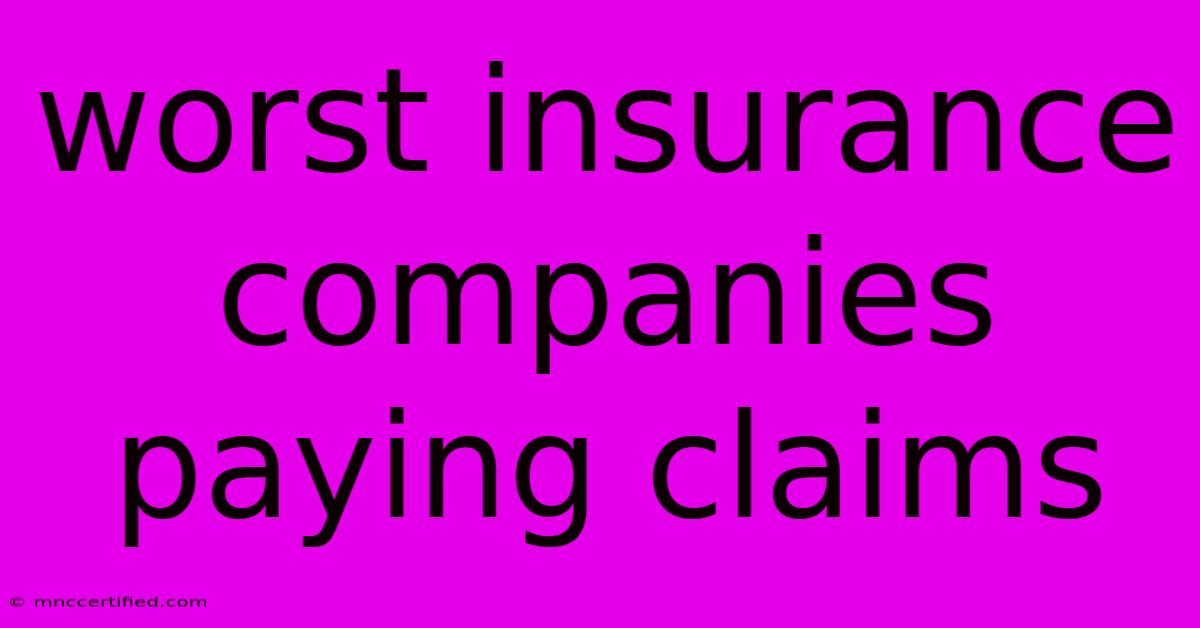Worst Insurance Companies Paying Claims

Table of Contents
The Worst Insurance Companies for Paying Claims: A Comprehensive Guide
It's a nightmare scenario: you've experienced a covered loss, whether it's a car accident, house fire, or medical emergency. You file a claim, expecting your insurance company to be there for you. But what happens when that support doesn't materialize? You're left dealing with the stress of your loss, plus the frustration of a company that seems determined to avoid paying what they owe.
Unfortunately, some insurance companies have a reputation for making the claims process unnecessarily difficult, delaying payments, or even denying legitimate claims altogether.
This article will explore the factors that contribute to poor claim-paying experiences and expose some of the worst insurance companies for paying claims, based on customer complaints, industry rankings, and legal actions.
How Insurance Companies Can Make Claim-Paying Difficult
Before diving into specific companies, it's crucial to understand the tactics some insurers use that can make the claims process a nightmare:
- Lowballing offers: This involves offering significantly less than the actual value of your claim, forcing you to fight for what you deserve.
- Unnecessary delays: Prolonging the process through bureaucratic roadblocks, excessive paperwork, or delaying communication can be extremely frustrating.
- Denying legitimate claims: Finding reasons to deny claims based on technicalities or ambiguous policy language is another common tactic.
- Poor customer service: Dealing with unresponsive representatives, rude behavior, and lack of transparency can further exacerbate the stress of a difficult situation.
Factors to Consider When Evaluating Insurance Companies
To find the best insurance company for you, it's crucial to consider more than just price:
- Customer satisfaction ratings: Check independent websites like J.D. Power, Consumer Reports, and the Better Business Bureau to see how other customers rate their claims experiences.
- Financial stability: Research the company's financial strength and rating from reputable sources like A.M. Best or Moody's.
- Complaint ratios: Look at the number of complaints filed against the company with state insurance departments.
- Claims-paying history: While not always publicly available, you can find information about company claims practices through industry news and legal actions.
Identifying the Worst Insurance Companies for Paying Claims
While specific companies may change over time, here are some that have consistently garnered negative feedback for their claims handling:
- Geico: Frequently cited for lowballing offers, long wait times, and difficult claims processes.
- Progressive: Known for its aggressive advertising, but many customers complain about their claims handling practices.
- Allstate: Has faced criticism for its complex policies and challenging claims processes.
- State Farm: Despite its positive brand image, State Farm has been involved in numerous lawsuits and complaints regarding claims handling.
What Can You Do?
If you find yourself dealing with a difficult insurance company, remember you have options:
- Be proactive: Document every interaction, including dates, times, and details of conversations.
- Know your policy: Familiarize yourself with the terms and conditions to ensure you understand your coverage.
- Contact the state insurance department: Report any unfair or unethical practices to your state's regulatory agency.
- Consider seeking legal advice: An attorney can help navigate the complex legal system and fight for your rights.
Choosing the Right Insurance Company:
Ultimately, the best way to avoid a bad claims experience is to choose an insurance company that is known for its fair and transparent practices. Before you sign up, do your research, compare companies, and read customer reviews. Remember, the most important factor is finding a company that will be there for you when you need it most.

Thank you for visiting our website wich cover about Worst Insurance Companies Paying Claims. We hope the information provided has been useful to you. Feel free to contact us if you have any questions or need further assistance. See you next time and dont miss to bookmark.
Featured Posts
-
Draymond Green Suns Championship Hope
Nov 08, 2024
-
Why Jadon Sancho Didnt Sign For Chelsea
Nov 08, 2024
-
Do Naturopathic Doctors Accept Insurance
Nov 08, 2024
-
M6 Update Lorry Driver Killed In Crash
Nov 08, 2024
-
North Korea Troops In Russia Pentagons Response
Nov 08, 2024